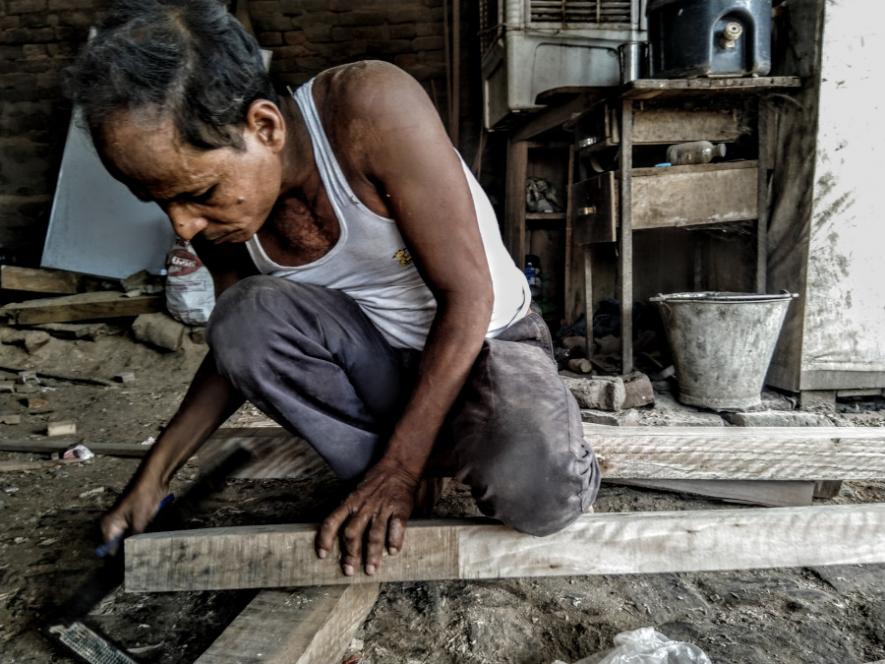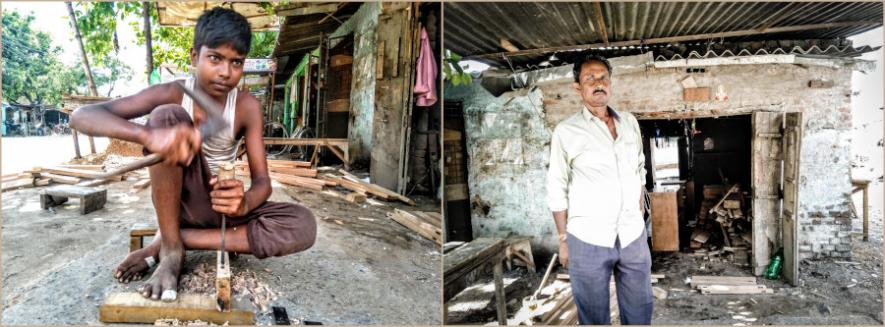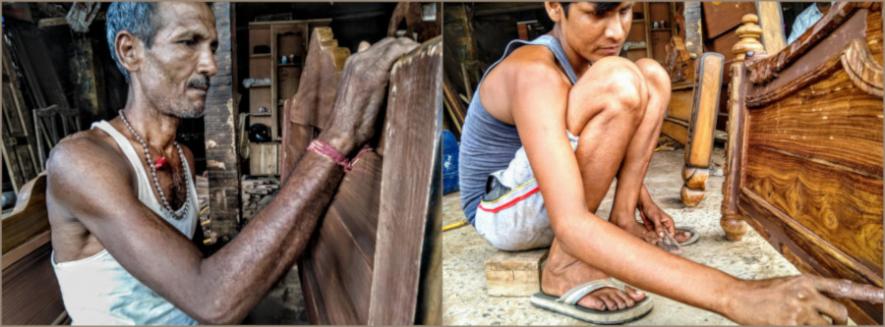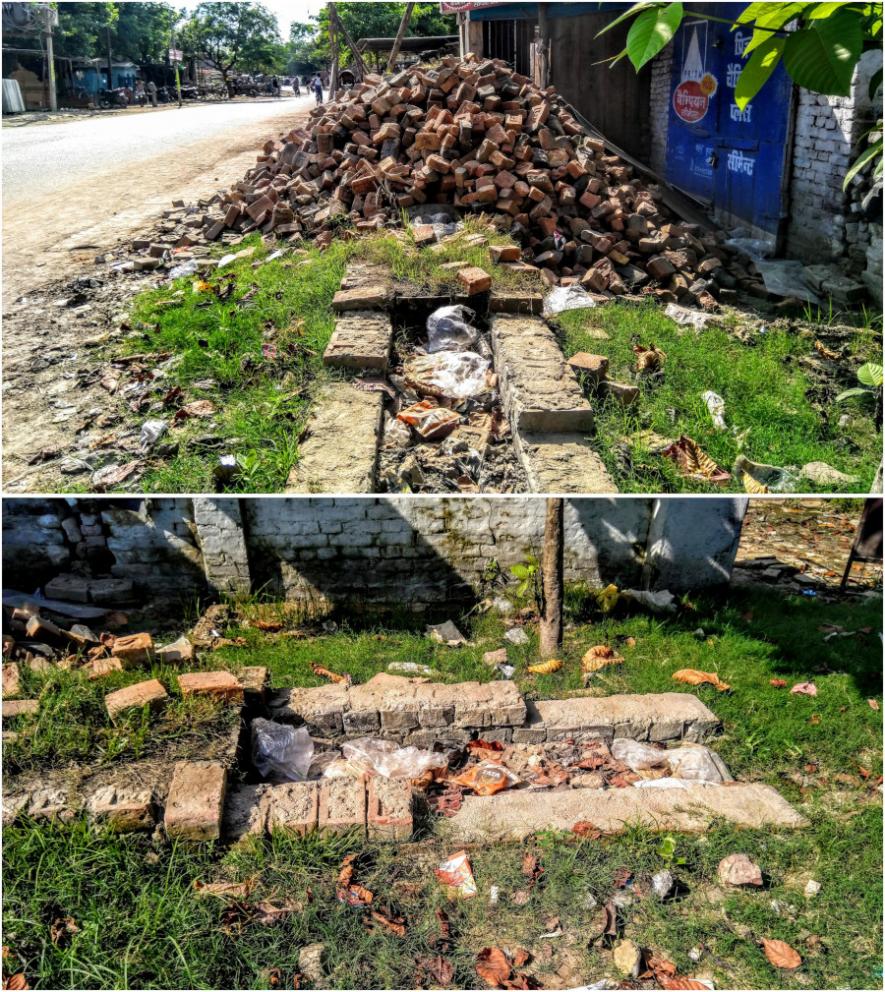Carpenters in Bihar: Slicing, Tooling and Patching the Future

Mohammed Bukhari learnt carpentry a decade ago to enhance his labour income. | Images courtesy: Ujjawal Krishnam
Jaanpul, an area in Motihari town of Bihar, known for the congregated traditional workshops, remains mired in flash floods each year for a week or two as monsoon arrives. As the water level has reduced, the businesses have started regaining the rhythm. Among them is the carpentry work, which has employed more than 100 people on a stretch of land smaller than 150 metres. Some people work as the daily wage carpenters in the big timber workshops parallelly collocated along the Jaanpul-station road, while, for others, carpentry is a subsistence business here.
Pradip Pandit, in his early forties, runs a small carpentry workshop. Pandit, a kumhar (potter) by caste, had to switch his traditional profession. Pottery, Pandit says, was not profitable enough to support the “modern” needs. By “modern needs”, Pradip means the demands of better lifestyle, including education for the children. Pradip is slicing the wood for the windowpane–the order he received today. Pradip is a daily wage labourer; he does not make furniture in advance. Thus, the profit for Pradip is limited to a daily pay of Rs 400. The wood slices, boards and sticks are provided by the customer, the job of Pradip is to just lumber and tool them into required articles. He says, “I do not own a large workshop, nor there is any helper here.” “Thanks to the machines that we could survive against inflation,” Pradip tells us how electrical circular saw helped him improve efficiency.”
“The task, which earlier required two labourers with a handsaw is done by one labourer today, but it demands money to buy sophisticated instruments,” he adds, telling us that he bought the saw for Rs 4,500 with his small savings four years ago.
For Pradip, the adversities in the carpentry have significantly reduced due to introduction of new tools, however, his business is yet to prosper. Pradip, a resident of Sagar Churaman village of Kotwa tehsil of East Champaran, lives in a joint family of 35. He shared with us a Bhojpuri proverb– “Sadak ke kutta aur badhai ke jingi eke barabar hola (The life of a street dog and that of a carpenter share no difference)” – describing the ordeals carpenters usually face. “We have to bargain with customers,” he continues, “anyone providing cheap labour is favoured.”
There is no organisation to the rescue of the carpenters here. Pradip told NewsClick that the business union formed with the collaborative efforts of carpenters under the name ‘Timber Association, Purbi Champaran’ is no longer functional. “In fact, the decision taken by the association in 2015-16, at the time it was formed, to suspend all the work on Sundays was never followed, let alone determining the minimum wage for us,” Pradip explains, as he prepares to visit a customer. He also tells us that some carpenters surreptitiously delay the work and end up earning more. “As the demand for wooden furniture has fallen, there is less amount of work, but a greater number of workers,” he adds. He attributes the joblessness and lack of rehabilitation measures taken by the administration to this display of disunity and unethical behaviour.

Arun [left] has no high ambition; Arunâs father Pradip [right] runs a small workshop to contribute to the joint-family income.
After Pradip is gone, his son Arun Kumar picks up a rasp and begins sloughing off the wooden scabs which are to be fitted in the windowpane. Arun studies in class V in a government school near his home; his proficient use of rasp and claw hammer makes us believe that his skills are maturing. However, Arun had sustained cuts on toes and foot while learning this art. Asked about his dream job, Arun says, “Kauno badka sapna naikhe…Matric ke bad me kauno chal jai, jathiyo naukri mile. (I don’t have any big dream…Any job with a minimum eligibility of matriculation will work.)”
Satya Mohan Thakur owns a carpentry workshop across the road. He is angered by high tax slabs of GST, an indirect tax imposed on the supply of goods and services in the country, on the furniture goods. He explains, “If government takes away almost one-fifth of the earning, will not it prove costly for manufactures and customers? Who will tolerate it? Sometimes we do, sometimes customers. It does not always happen that we end up selling the product. We must wait for days, sometimes months, for a suitable customer. Also, we need to ensure that furniture doesn’t deteriorate in equality. It takes a lot of efforts.”
“The corruption in public offices,” Satya Mohan continues, “is a reason why we avoid filling tenders. They will not approve your file if you don’t pay 30% of the tender amount. You can imagine what kind of furniture supplies would be made in such circumstances by the contractors?”

Satya Mohan [left] was denied any extension to the self-employment loan; the elevated faulty structure [right] of the drain adds to the woes of timber workshops.
Satya Mohan had taken a loan of Rs 1 lakh under Pradhan Mantri Rozgar Yojana (PMRY), a central government initiative to enhance self-employment opportunities in 2008. He bought electro-mechanical devices of Rs 1.5 lakh to modernise his workshop. Meanwhile, he repaid the loan amount, but was not further granted the loan by the authority when he visited the bank last year. “I have already paid the amount. There is no due on the ledger, I am your trusted customer, then why aren’t you helping me anymore when I need it?”
Satya Mohan lost the paddy seedlings due to waterlogging in the fields following incessant rains this year. Like Satya Mohan, Brijesh Singh, his subordinate at the workshop, lost five bigha of paddy crop in his village Raisingha of Chhatauni panchayat of Motihari tehsil. Before Brijesh joined Satya Mohan’s workshop two years ago, he was working on the random day-to-day labour contracts with no sense of job security. Here, he has a regular job. Brijesh calls himself a “wood painter”, Satya Mohan is appreciative of Brijesh’s skills. Brijesh says, “Inha ke sansad Radha Mohan Singh krishi mantri rahle…kaun chiz ho gael hamni ke…biya tale daha ja ta. (Our MP Radha Mohan Singh was the Minister of Agriculture [in the previous government]. What benefit have we received? Even seedlings are being washed away.)”
Another worker at Satya Mohan’s shop is 45 years old Vasudev Singh who is smoothening the wood surface with sandpaper, afterwards, he would be spraying and coating it. Vasudev arrives at the workshop at 10.30 am and leaves by 5.30 pm, with earning not more than Rs 400. However, Vasudev avoided speaking much about it, perhaps, because of the presence of the owner.

Vasudev [left] is cleaning the rough edges of the wood with abrasive paper while Brijesh [right] is coating the footboard of a bed.
Mohammed Bukhari, using a trisquare and a pencil, is scaling a wood slab out of which he has been instructed to make door frames and thresholds. Bukhari works at a shop next to Pandit’s shop. He says he learnt carpentry some 10 years ago. Before that, he was a manual worker. Md Bukhari says in a soft and sibilant voice, “Manual labourers get roughly between Rs 150 and Rs 300 a day. With this, I earn a little better. Even so, the increment is meagre, thus it equally exacerbates the livelihood of a labourer whether he or she is skilled or not.” “We are bound to this work; it is obligatory if not satisfactory. In any circumstance, we must stick to this profession,” supplements Umashankar, 26, who works with Bukhari.
In a workshop, timbers are also sold along with on-demand services of carpentry and joinery. Shafi Ahmad, the owner of the workshop, says, “Dhanda abhi manda[i] ke taraf ja rahal hai. (The business is approaching a slowdown.)” Shafi had a greater number of hands in his workshop than it has today, the number of workers has been reduced to four. “We had to keep the workshop closed for more than 10 years last month; rains have added to our asperity,” Shafi says as he refers to the flash floods, which bring Northern plain of Bihar to a halt each year. For this, he also blames the faulty town planning by Motihari Municipal Council.

Broken structure of a ditch in Motihari town.
He shows us the broken structure of a ditch running along the road and says, “When it rains, the overflowing water enters our workshop. We then carry the chattels home or keep them at a higher position to ensure that wood remains dry. This unnecessarily wastes our labour time and mulcts us.”
Asked about the initiatives taken by government in this sector, Shafi knows none, but responds with “the price of sakhua wood log has doubled from Rs 1,200 per cubic feet to Rs 2,500 per cubic.” He asks, in an evident political tone, irately, “Is this vikash (development)?” “Kashmir aur Pakistan par focus ba, hamnike kaun sa dhyan diael ba bina koi dhara rokle ke? (They are only focussing on the issue of Kashmir and Pakistan, why don’t they look at us? Which Article from the Constitution is preventing our development?)”
Also read: Inside Motihari’s District Hospital: Screams, Negligence, Discrimination
Get the latest reports & analysis with people's perspective on Protests, movements & deep analytical videos, discussions of the current affairs in your Telegram app. Subscribe to NewsClick's Telegram channel & get Real-Time updates on stories, as they get published on our website.























